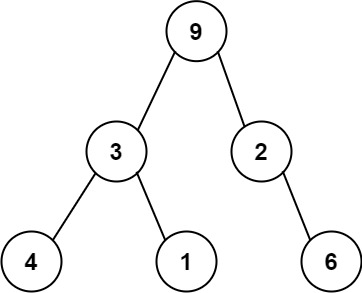Problem
One way to serialize a binary tree is to use preorder traversal. When we encounter a non-null node, we record the node's value. If it is a null node, we record using a sentinel value such as '#'.

For example, the above binary tree can be serialized to the string "9,3,4,#,#,1,#,#,2,#,6,#,#", where '#' represents a null node.
Given a string of comma-separated values preorder, return true if it is a correct preorder traversal serialization of a binary tree.
It is guaranteed that each comma-separated value in the string must be either an integer or a character '#' representing null pointer.
You may assume that the input format is always valid.
- For example, it could never contain two consecutive commas, such as
"1,,3".
Note: You are not allowed to reconstruct the tree.
Example 1:
Input: preorder = "9,3,4,#,#,1,#,#,2,#,6,#,#"
Output: true
Example 2:
Input: preorder = "1,#"
Output: false
Example 3:
Input: preorder = "9,#,#,1"
Output: false
Constraints:
1 <= preorder.length <= 10^4preorderconsist of integers in the range[0, 100]and'#'separated by commas','.
Solution
class Solution {
public boolean isValidSerialization(String preorder) {
int count = 1;
int length = preorder.length();
for (int i = 1; i <= length; i++) {
if (i == length || preorder.charAt(i) == ',') {
--count;
if (count < 0) {
return false;
}
count += preorder.charAt(i - 1) == '#' ? 0 : 2;
}
}
return count == 0;
}
}
Explain:
nope.
Complexity:
- Time complexity : O(n).
- Space complexity : O(n).